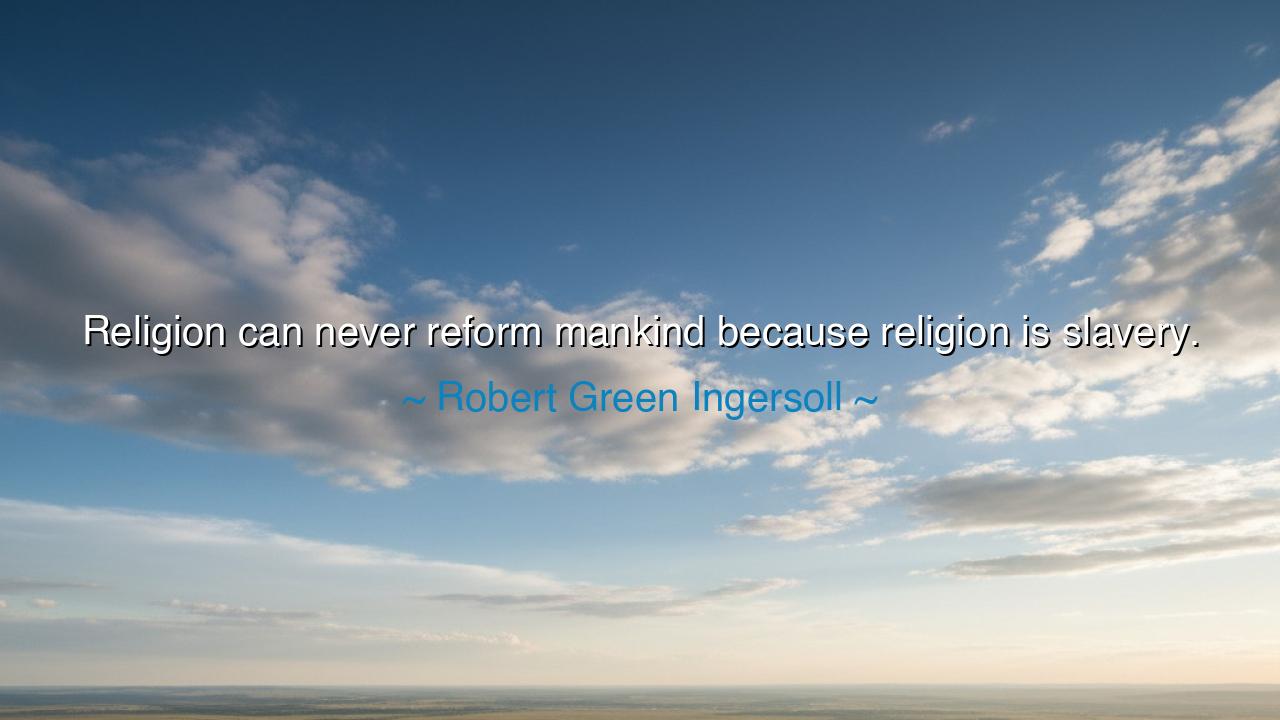
Religion can never reform mankind because religion is slavery.






“Religion can never reform mankind because religion is slavery.” – Robert Green Ingersoll
These fierce and luminous words from Robert Green Ingersoll, the 19th-century orator and humanist often called “The Great Agnostic,” strike with the force of thunder. He spoke them not from hatred of faith, but from love of freedom — from a conviction that the human spirit was meant to rise, not bow. Ingersoll lived in an age when dogma ruled like a tyrant, when belief was enforced by fear, and when the authority of religion too often silenced reason and compassion. His declaration that religion is slavery was not a rejection of the divine, but a call to break the chains of blind obedience — to awaken humanity to its own power to think, to love, and to act without fear of celestial punishment or priestly control.
To understand the origin of this quote, we must look to Ingersoll’s time. He was born into a world still scarred by the shadow of the Inquisition and still trembling under the weight of religious orthodoxy. Across continents, men and women had been tortured, silenced, and burned for daring to question the dogmas of their day. Even in America, the land of liberty, religious intolerance haunted the courts, the schools, and the homes. Ingersoll saw how systems of power used religion not to uplift mankind, but to subdue it — not to liberate thought, but to chain it. When he said that religion cannot reform mankind, he meant that no institution built upon fear can ever nurture freedom, and no creed that demands submission can ever cultivate virtue.
He drew strength from the lineage of thinkers who came before him — from Voltaire, who laughed at superstition; from Thomas Paine, who wrote The Age of Reason and declared that his mind was his own church; and from the ancient philosophers who taught that truth is found not in decree, but in discovery. Like them, Ingersoll believed that the soul of man is sacred, and that to imprison it within doctrines and threats is to blaspheme against the divine itself. He once said, “Happiness is the only good; reason the only torch; justice the only worship; humanity the only religion.” To him, true faith was not in gods, but in the goodness of man — in the capacity of humanity to rise through love, learning, and liberty.
Consider the story of Galileo Galilei, the astronomer who, in the seventeenth century, lifted his telescope to the heavens and saw what no man before him had seen — that the Earth was not the center of the universe. For this revelation, born of reason and courage, the Church condemned him, forced him to recant, and silenced his voice for the rest of his life. Yet time proved Galileo right. His suffering became a symbol of Ingersoll’s truth — that religion bound by power cannot reform mankind, because it fears the light of inquiry more than the darkness of ignorance. When belief becomes a prison, only the courage to question can set the spirit free.
Ingersoll’s fire, however, was not meant to destroy, but to illuminate. He did not call for the death of faith, but for its transformation. What he opposed was not belief in the divine, but the enslavement of the mind. He urged mankind to outgrow the fear of eternal punishment, to rise beyond the need for intermediaries between the human heart and truth. His vision was that of a world where morality flows not from commandments, but from conscience; where goodness is chosen freely, not performed out of fear. He understood that only a free soul can love deeply, think clearly, and act justly. To reform the world, man must first reclaim his own mind.
The lesson is this: question all that demands your submission. Do not accept truth because it is ancient, nor reject it because it is new. Seek the divine not in the temples of power, but in the quiet voice of your own reason and compassion. For if religion becomes a chain that binds thought, it ceases to be sacred; but if it becomes a force that inspires justice, mercy, and truth, then it ceases to be slavery and becomes wisdom. The task of every soul is not to destroy belief, but to redeem it — to lift it from fear into freedom, from ritual into revelation.
So remember the voice of Robert Green Ingersoll, whose courage burned like a torch in the age of conformity: “Religion can never reform mankind because religion is slavery.” Do not take his words as an invitation to cynicism, but as a summons to liberty. Free your mind from the tyranny of unquestioned belief. Let love be your law, reason your guide, and humanity your faith. For when man ceases to kneel in fear and begins to stand in truth, then, and only then, will he be both fully human and truly divine.






AAdministratorAdministrator
Welcome, honored guests. Please leave a comment, we will respond soon